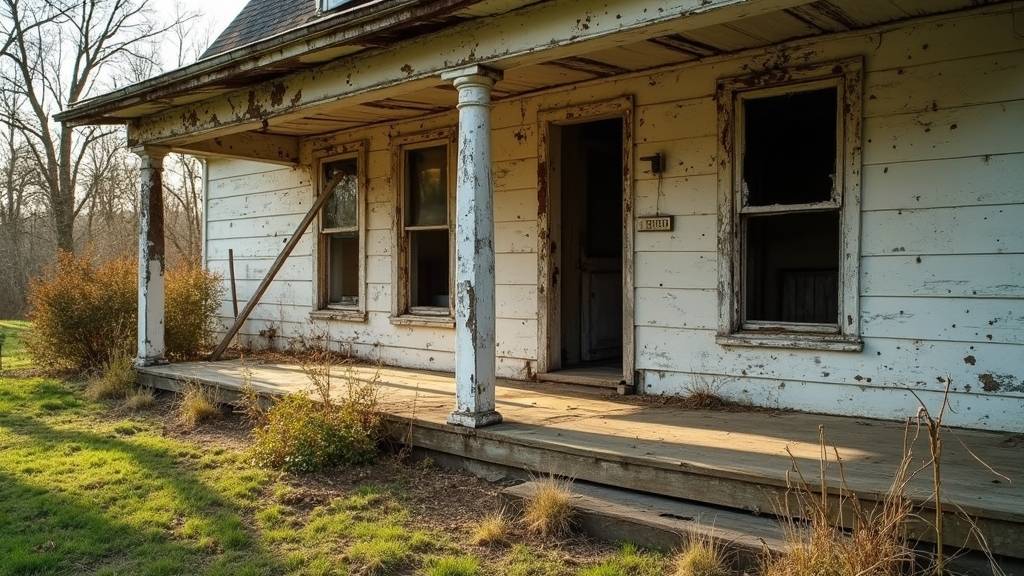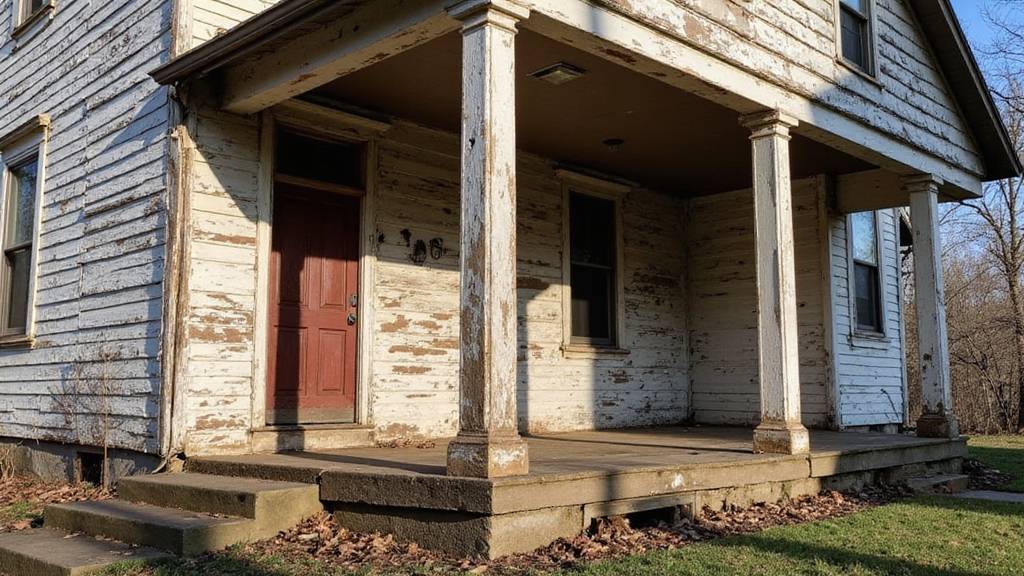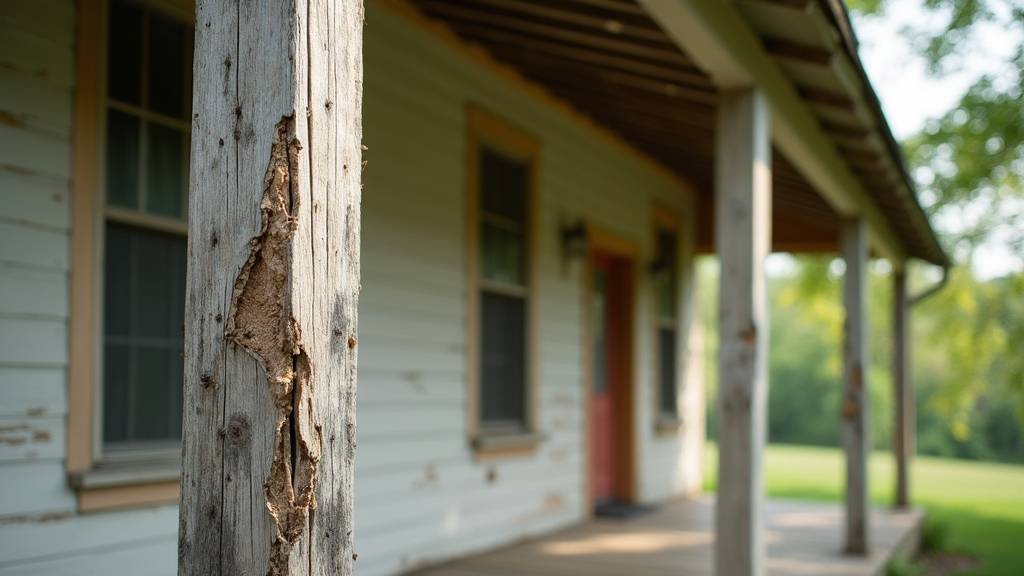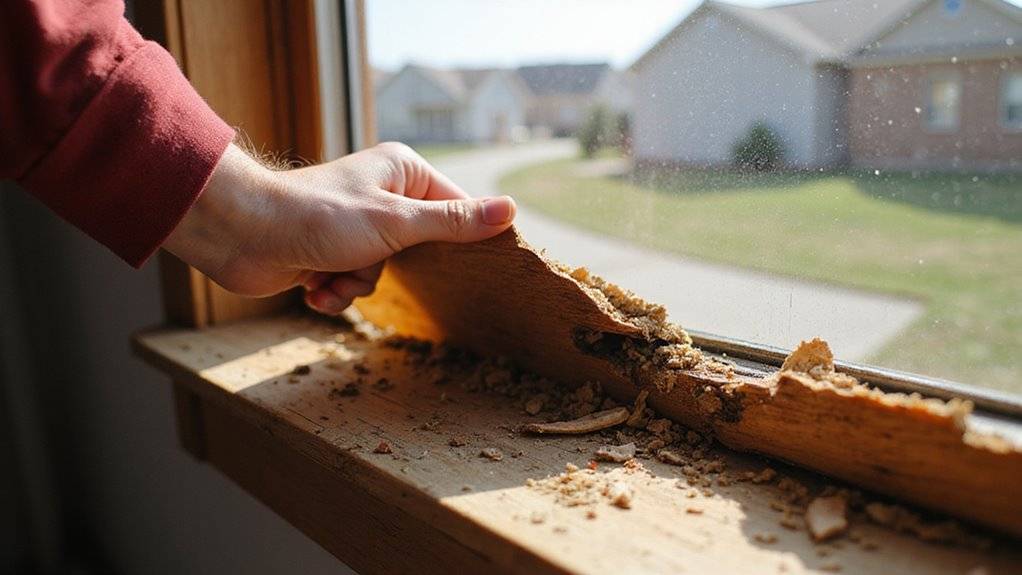Selling a house with termite damage in Missouri can feel overwhelming. Termite issues often scare buyers and affect your home’s value. Missouri’s strict disclosure laws add another layer of stress for sellers.
You may worry that buyers will walk away or demand big discounts. Lenders might also hesitate to finance a home with hidden damage. The longer your house sits on the market, the more difficult your situation becomes. You can sell a house with termite damage in Missouri if you disclose the problem, provide documentation, and follow state laws.
Clear communication and preparation make the process smoother for everyone involved. Doing things right helps protect your sale and your reputation. This blog will guide you step by step to solve your termite home-selling problems in Missouri.
Key Takeaways
- Disclose all known termite damage and treatments as required by Missouri law to avoid legal issues and build buyer trust.
- Obtain a professional termite inspection and gather documentation, including repair and treatment records, to share with potential buyers.
- Decide whether to repair the damage or sell the home as-is, considering repair costs versus potential sale price.
- Consider selling to investors or cash buyers for a quicker, hassle-free sale if extensive repairs are needed.
- Use transparent marketing, clear photos, and competitive pricing to attract buyers and minimize negotiation delays.
Understanding Termite Damage and Its Impact on Home Value

Termite damage can lower your home’s value. These insects eat wood, which weakens important parts of the house. If damage is severe, your home may be worth much less.
Termites often stay hidden for years and cause harm without obvious signs. Industry research shows U.S. homeowners spend over $5 billion each year fixing termite problems. If you plan to sell, a professional inspection can show if termites are present. Professional pest inspection can help identify issues early before they worsen.
Buyers may lower their offers if repairs are needed. They could also back out if damage is too serious. If you repair termite issues early, you protect your home’s value.
If you act quickly and fix problems, you show buyers that the home is cared for. Regular inspections and repairs help keep your selling process smooth. Taking these steps can make your home more attractive to buyers. Proper pest control measures can prevent further damage and improve your chances of a successful sale.
Missouri Disclosure Laws for Termite Issues
Missouri law says home sellers must tell buyers about any known termite damage or infestations. The Seller’s Disclosure Statement asks directly about wood-destroying insects like termites. If you hide this information, you could face lawsuits or lose the sale.
Sellers must reveal both current and past termite problems. Most normal home sales require disclosure, but a few exceptions exist. Transfers between close family or inheritance may not need disclosure. Fair cash offers can still be available even if termite damage is present, especially when working with a local buyer who understands the property’s condition.
Accurate disclosure is important for trust and legal protection. If you are unsure about your obligations, ask a real estate professional. Knowing the rules helps you avoid problems after closing. Effortless selling process can help you sell your house quickly even if termite damage is present.
Signs of Termite Damage to Look For

Termite damage often shows visible and hidden signs. Hollow-sounding wood, bubbling paint, and mud tubes are common indicators. Crumbling baseboards or sagging floors may also mean termites are present.
Detecting these signs early can help prevent further structural issues. Proper inspection techniques are essential for identifying the extent of damage and planning appropriate repairs. Discarded wings around windows or doors suggest recent termite activity. Unexplained pinholes in drywall can also be a warning sign.
If you notice these issues early, you can better understand the damage. A thorough check helps you address concerns before selling. Conditioned on early detection, you gain time to fix problems buyers might spot.
Getting a Professional Termite Inspection
A professional termite inspection is needed to know the true condition of your home. Only a licensed inspector can find all signs of termites and damage. This is important before selling your Missouri home.
Inspectors use special tools and a step-by-step checklist. They look for active termites and hidden damage. They also check if prevention methods are in place.
The inspector will note any termite activity, past or present. You will receive a report for buyer confidence and legal disclosure. If you secure this inspection, you make the selling process smoother.
According to the National Pest Management Association, termites cause $5 billion in yearly damage. This shows why expert inspections are necessary. Buyers expect clear and honest information about the property’s condition.
Proper documentation and a detailed report can also help you avoid potential disputes related to home sale capital gains exclusions, ensuring you meet IRS requirements if applicable.
Estimating Repair Costs and Treatment Options

After you confirm termite damage, you need to estimate repair costs and review treatment options. Get quotes from certified pest control companies for termite treatment. Consult licensed contractors for repair estimates, including hidden damage. Selling your house without an agent can simplify the process and help you avoid extra fees. Missouri homeowners usually pay $500 to $2,500 for termite treatments. Structural repairs can cost much more, depending on the damage. If the damage is severe, repairs may go beyond $8,000.
Conducting a thorough inspection early in the process allows you to better understand the full extent of the damage and plan accordingly. Use the table below to compare common treatment and repair options. Doing so helps you plan for costs and time needed. Careful budgeting prepares you for buyer negotiations and next steps.
Deciding Whether to Repair or Sell As-Is
Now that you know your repair costs, you’ll need to weigh those expenses against your home’s market value and potential sale price. Consider whether fixing the damage will yield a better return or if selling as-is makes more sense financially. No matter which option you choose, you’re legally required to disclose all known termite damage to buyers.
Additionally, understanding your local market challenges can help you make an informed decision about the best selling approach. If you’re in a hurry or prefer a hassle-free process, working with local cash home buyers like Freedom Path Investors can offer a quick and fair solution, especially when facing unexpected property issues.
Assessing Repair Costs
Accurately assessing repair costs helps you decide whether to fix termite damage or sell your house as-is. A clear estimate prevents unexpected expenses. Careful planning saves money in the long run.
First, schedule a pest control inspection to see how much damage termites have caused. The inspector should give you a detailed report and treatment cost.
Next, collect written estimates from licensed contractors for any repairs. Always ask for quotes from at least two professionals. These estimates should cover both visible and hidden damage.
Missouri homeowners often underestimate repair costs. If you are unsure, use local data from experts instead of guessing. This helps you set a realistic budget.
If you want to make the best choice, factor in both immediate and future repairs. Good planning lets you make a smart decision for your property’s future.
Weighing Market Value
Knowing repair costs helps you compare your home’s value in its current and improved states. Check how similar homes in Missouri have sold, both as-is and after repairs. This shows how damage, like termites, affects your home’s price.
Local listings and real estate agents can give useful data. If repair costs are lower than the value gained, repairs may be worthwhile. If repairs do not add much value, selling as-is could be smarter.
Always consider the time, money, and effort needed for repairs. Weigh these against the expected sale price. This method helps you decide how to get the best market value for your home.
Disclosing Damage Legally
Missouri law requires you to tell buyers about any termite damage or infestations you know about. If you hide this information, you could face lawsuits or lose the sale. These rules help protect both buyers and sellers during the transaction.
You must share all details about termite activity, even if repairs were made. Inspection reports and repair records are important for showing honesty. These documents also help lower your risk.
Sellers in Missouri need to fill out the Seller’s Disclosure Statement. This form makes sure you meet all legal requirements. Using it keeps the process clear and fair for everyone.
If you are open with buyers, you protect yourself from legal trouble. You also make the sale process smoother. Always provide any related paperwork to support your disclosure.
Weighing the Pros and Cons of Selling to Investors
Selling to investors has both pros and cons. Investors often buy houses with termite damage as they are, which saves you repair time. If you need to sell quickly, this option can work well.
Investors focus on properties they can fix up and sell for a profit. Their offers are usually below market value because they plan for repair costs and risks. If you want the highest price, a traditional sale may be better.
The main benefits are speed and ease. You avoid long negotiations and repair hassles. If your priority is selling quickly, selling to an investor could be a good fit.
If you need more money from the sale, consider fixing the damage first. Weigh your timeline, financial needs, and goals before deciding. Each option has trade-offs, so choose what suits your situation best.
Additionally, working with a local, trusted home buyer who specializes in as-is sales can provide a smooth and professional experience, especially when dealing with termite damage.
Working With Real Estate Agents Experienced in Termite Sales
Working with real estate agents who know about termite sales can help you sell your home more easily. These agents have experience with pest issues and local rules. If you want a smoother sale, consider choosing an agent with termite knowledge.
An experienced agent will arrange for pest control and provide clear records to buyers. Proper documentation can help build trust and speed up the sale. If documentation is missing, buyers may hesitate or offer less. Working with a local expert ensures that all necessary steps are handled correctly and efficiently.
Agents suggest having a home inspection before listing your house. This helps you avoid surprises during the sale process. If problems are found early, you can address them and negotiate better.
Real estate agents also know how to market homes with minor damage. They use the right words and set realistic expectations for buyers. If you work with a specialist, you may get better offers and faster results.
Additionally, understanding land contract rules can be beneficial if you’re selling a property under such an agreement, ensuring compliance and smoother transaction processes. Familiarity with local property laws can also prevent potential legal issues during the sale.
Setting the Right Asking Price for a Home With Termite Damage
To price your home accurately, start by getting professional repair cost estimates for the termite damage. Compare these numbers against recent sales of similar homes without issues to gauge the market value impact. You’ll also want to leave room for buyer negotiations, as most buyers expect concessions when termite problems are disclosed. Additionally, understanding proper valuation methods can help ensure you set a realistic asking price that reflects both the damage and current market conditions.
Assessing Repair Cost Estimates
You need accurate repair cost estimates to set a fair price for a home with termite damage. A clear estimate helps you understand what repairs are needed. It also shows buyers you have considered all costs.
A licensed contractor should inspect the property for termite damage. The contractor will check both structural repairs and home insulation. If any hidden termite issues exist, the inspection will reveal them.
A pest control expert must confirm the infestation is gone. The expert should also provide a report on future risks. Buyers will want these documents as proof.
If you follow these steps, you can set a realistic price. Accurate estimates also give you more power during negotiations. Clear information builds trust with buyers.
Comparing Market Value Impact
Termite damage can lower your home’s market value. To find the impact, compare your home to similar nearby homes without termite issues. Look at their sale prices and conditions.
Subtract your repair costs from these sale prices to estimate your home’s current value. If termite damage is severe, the price drop may be larger. Homes with termite problems often sell for 10-20% less.
Using these steps, you can set a fair asking price. This helps attract buyers and shows the true effect of the termite damage. If you use real data, your price will be realistic and competitive.
Factoring Buyer Negotiation Room
To make your listing attractive, set a fair price and plan for buyer negotiations. Missouri buyers often ask for discounts on homes with termite damage. Sellers can protect their profit by allowing room for negotiation.
A seller should set the asking price a little above their lowest acceptable amount. This leaves space to lower the price during talks. If the price is too high, buyers may avoid your home.
If sellers have repaired termite damage, they should provide all receipts and repair records. Estimates for any remaining issues help build trust. Buyers feel more comfortable when they see transparency.
Sellers should watch for buyer feedback after listing. If interest is low, the seller can adjust the price quickly. Quick adjustments help keep the home competitive. A careful, data-based approach can help sellers get the best final price. Proper planning protects your bottom line.
Marketing Strategies for Homes With Known Issues
Selling a home with known issues, such as termite damage, can still attract buyers if you use the right strategies. Home staging can help highlight the house’s best features, making flaws less noticeable. If buyers see clean, bright spaces, they may imagine living there.
Location is important for most buyers. You should point out the home’s closeness to schools, parks, and shops. If the neighborhood is appealing, buyers may overlook some problems.
Honesty in your listing is key. Clear photos and detailed descriptions should mention the issues but also show the home’s value. If you build trust, serious buyers are more likely to respond.
Negotiating With Buyers and Handling Offers
When you get offers on a home with termite damage, be honest and prepared. Buyers want to see proof of what has been found and fixed. If you handle concerns directly, you can keep your position strong.
You should share all inspection reports and explain any repairs or treatments done. Buyers are more likely to make good offers if they see clear evidence of work. Homes with proper documentation often attract better interest.
If buyers are worried, offer repair credits or suggest a price change. Use information from recent home sales to support your offer. Good communication and clear proof of value can help you reach a fair deal.
Navigating Appraisals and Lender Requirements
You’ll need to address how termite damage affects your home’s appraisal, as it often leads to lower valuations and stricter lender scrutiny. Most lenders will require repairs or proof of treatment before approving a mortgage, so be ready to provide documentation. Taking proactive steps can help you avoid costly delays and keep the transaction on track.
Impact on Property Valuation
Termite damage can lower your home’s value when you sell. Appraisers notice weakened structures and may reduce the market price. Buyers and lenders also want proof of pest control.
Visible damage or old termite activity can lead to lower offers. Homes without termite history often sell for more money. Missouri law requires you to tell buyers about any termite problems.
If you fix termite damage quickly, you may reduce value loss. Taking action early helps protect your investment. Proper prevention can make your property more appealing to buyers.
Lender Repair Demands
If an appraiser finds termite damage, most lenders will require repairs before they approve the buyer’s loan. Lenders in Missouri have strict rules about this. They usually will not finance a home with structural issues or active termite problems.
Homes with unresolved termite damage can lose 10%–25% of their value. If you do not fix these issues, your sale may be delayed or canceled. Lenders want both structural repairs and visible improvements completed.
A licensed pest control company should be hired to inspect and treat the home. After repairs are finished, your property will better meet lender standards. This also gives buyers more confidence and helps keep your sale moving forward.
Documentation for Loan Approval
When selling a house with termite damage, proper documentation is necessary for loan approval. Lenders want proof the problem was fixed. If you do not provide this, your loan process may be delayed or denied.
Gather pest control receipts and warranties. These should show what treatments were done and when. Lenders in Missouri require this information.
Include a termite inspection report from a licensed inspector. The report must confirm the house is free of active termites. Lenders and appraisers will review this document.
Add repair documents for any damaged wood or structure. Use invoices and photos to show all repairs. This helps prove the home is safe for buyers.
Preparing for Closing With Termite Damage
Closing with termite damage on your property needs careful planning and open communication. Sellers must finish all pest treatments and collect related paperwork. These documents should include warranties and inspection reports.
Providing proof of professional pest control can reassure buyers. The National Pest Management Association says 34% of buyers may continue if you share this proof. Full disclosure about termite history is important.
Home staging can help draw attention to the best parts of your house. If repairs are visible, use staging to minimize their impact. Keep the buyer, their agent, and your closing team updated on all repairs.
If you address concerns early, you will build trust with the buyer. Showing your diligence can prevent last-minute problems. This approach increases the chance of a smooth, timely closing even with termite history.
Tips for Moving Forward After the Sale
After the sale, keep your paperwork organized to protect yourself and streamline future transactions. Start planning your next move early, since data shows buyers who act quickly often secure better deals. When considering your next property, monitor for signs of pest issues to avoid repeating past challenges.
Organizing Post-Sale Paperwork
After selling your termite-damaged house, you must organize all post-sale paperwork. This protects your interests and ensures a smooth process. Missouri law may require you to keep certain documents for taxes or future disputes.
You should keep a copy of the deed transfer. The deed must include all restrictions and be shared with the buyer. If you fail to do so, you could face legal issues later.
Keep receipts and settlement statements for property taxes paid up to closing. These are important for your tax records. If you lose them, tax filing may become difficult.
File all termite inspection reports and disclosure forms together. These documents prove you met all legal requirements. If questions arise later, you will have the needed proof.
Staying organized can help you avoid problems in the future. Proper records make it easier to answer questions. You will also be prepared if a dispute occurs.
Planning Your Next Move
After selling a house with termite damage, focus on what comes next. Think about your future housing needs and set clear priorities. Taking action early can help you move forward smoothly.
If you plan to buy another home, schedule a home inspection. The National Pest Management Association reports that termites damage over 600,000 U.S. homes each year. Pest control checks are essential to avoid future problems.
You should pick experienced inspectors and reliable pest control companies. If you need to move, get quotes from different moving services. Create a budget that includes deposits and possible repairs in your new home.
Monitoring Future Property Investments
Monitoring future property investments means checking for risks like termites before you buy. Missouri’s humid weather increases the chance of pest problems. Careful checks help protect your money.
A licensed inspector should always examine the property. They use tools to spot termite damage that you might miss. Professional checks can prevent costly mistakes.
Inspection reports should be clear and detailed. The report should list any past pest problems and repairs. If you read the report, you can decide wisely.
Preventative pest control is important if you want to avoid future issues. Regular pest treatments keep your property safe. If you act early, you may save money later.
Conclusion
If you need to sell a house with termite damage in Missouri, honesty and preparation are key. If sellers disclose all issues and provide documentation, they can avoid legal trouble and build buyer trust. If repairs are handled or explained, deals are less likely to fall through.
If homeowners want a faster and easier sale, they can consider cash buyers. We buy houses for cash, even if there is termite damage or other problems. If you want to skip repairs and showings, a cash offer may be the best solution.
If you want a hassle-free sale, Freedom Path Investors can help. We guide you through every step and make fair cash offers. Contact us today to see how we can help you sell your home quickly.







